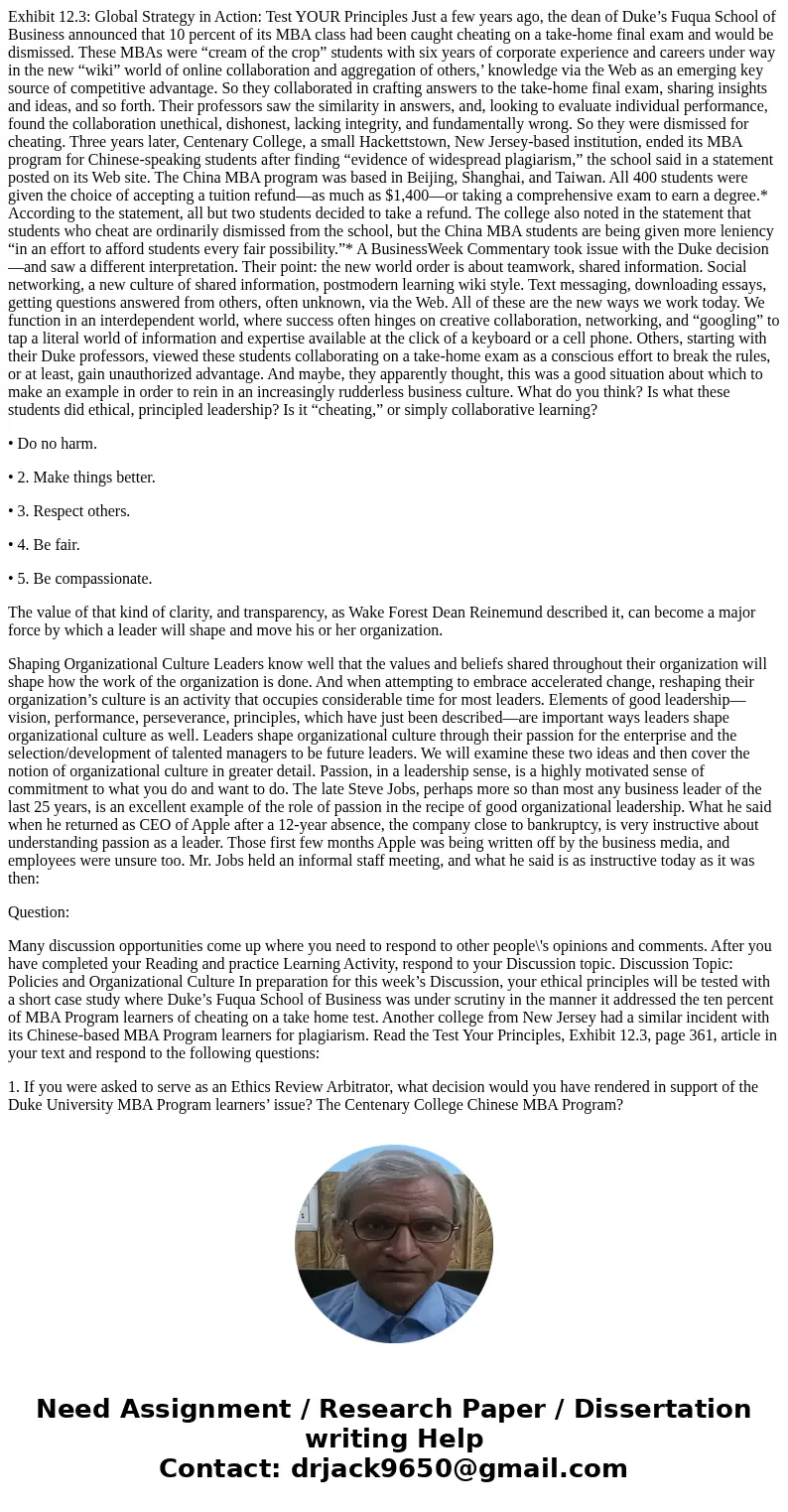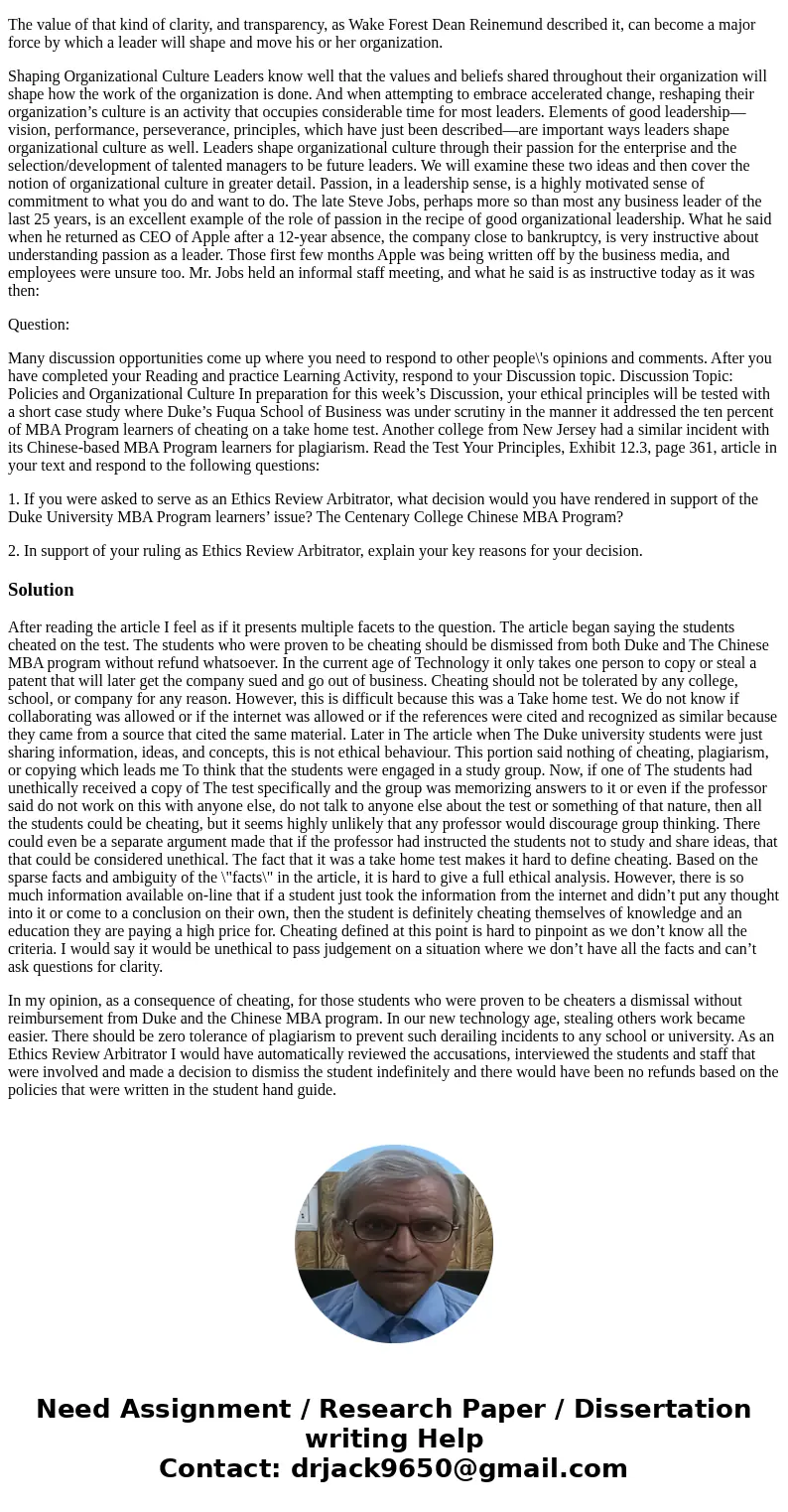Exhibit 123 Global Strategy in Action Test YOUR Principles J
Exhibit 12.3: Global Strategy in Action: Test YOUR Principles Just a few years ago, the dean of Duke’s Fuqua School of Business announced that 10 percent of its MBA class had been caught cheating on a take-home final exam and would be dismissed. These MBAs were “cream of the crop” students with six years of corporate experience and careers under way in the new “wiki” world of online collaboration and aggregation of others,’ knowledge via the Web as an emerging key source of competitive advantage. So they collaborated in crafting answers to the take-home final exam, sharing insights and ideas, and so forth. Their professors saw the similarity in answers, and, looking to evaluate individual performance, found the collaboration unethical, dishonest, lacking integrity, and fundamentally wrong. So they were dismissed for cheating. Three years later, Centenary College, a small Hackettstown, New Jersey-based institution, ended its MBA program for Chinese-speaking students after finding “evidence of widespread plagiarism,” the school said in a statement posted on its Web site. The China MBA program was based in Beijing, Shanghai, and Taiwan. All 400 students were given the choice of accepting a tuition refund—as much as $1,400—or taking a comprehensive exam to earn a degree.* According to the statement, all but two students decided to take a refund. The college also noted in the statement that students who cheat are ordinarily dismissed from the school, but the China MBA students are being given more leniency “in an effort to afford students every fair possibility.”* A BusinessWeek Commentary took issue with the Duke decision—and saw a different interpretation. Their point: the new world order is about teamwork, shared information. Social networking, a new culture of shared information, postmodern learning wiki style. Text messaging, downloading essays, getting questions answered from others, often unknown, via the Web. All of these are the new ways we work today. We function in an interdependent world, where success often hinges on creative collaboration, networking, and “googling” to tap a literal world of information and expertise available at the click of a keyboard or a cell phone. Others, starting with their Duke professors, viewed these students collaborating on a take-home exam as a conscious effort to break the rules, or at least, gain unauthorized advantage. And maybe, they apparently thought, this was a good situation about which to make an example in order to rein in an increasingly rudderless business culture. What do you think? Is what these students did ethical, principled leadership? Is it “cheating,” or simply collaborative learning?
• Do no harm.
• 2. Make things better.
• 3. Respect others.
• 4. Be fair.
• 5. Be compassionate.
The value of that kind of clarity, and transparency, as Wake Forest Dean Reinemund described it, can become a major force by which a leader will shape and move his or her organization.
Shaping Organizational Culture Leaders know well that the values and beliefs shared throughout their organization will shape how the work of the organization is done. And when attempting to embrace accelerated change, reshaping their organization’s culture is an activity that occupies considerable time for most leaders. Elements of good leadership—vision, performance, perseverance, principles, which have just been described—are important ways leaders shape organizational culture as well. Leaders shape organizational culture through their passion for the enterprise and the selection/development of talented managers to be future leaders. We will examine these two ideas and then cover the notion of organizational culture in greater detail. Passion, in a leadership sense, is a highly motivated sense of commitment to what you do and want to do. The late Steve Jobs, perhaps more so than most any business leader of the last 25 years, is an excellent example of the role of passion in the recipe of good organizational leadership. What he said when he returned as CEO of Apple after a 12-year absence, the company close to bankruptcy, is very instructive about understanding passion as a leader. Those first few months Apple was being written off by the business media, and employees were unsure too. Mr. Jobs held an informal staff meeting, and what he said is as instructive today as it was then:
Question:
Many discussion opportunities come up where you need to respond to other people\'s opinions and comments. After you have completed your Reading and practice Learning Activity, respond to your Discussion topic. Discussion Topic: Policies and Organizational Culture In preparation for this week’s Discussion, your ethical principles will be tested with a short case study where Duke’s Fuqua School of Business was under scrutiny in the manner it addressed the ten percent of MBA Program learners of cheating on a take home test. Another college from New Jersey had a similar incident with its Chinese-based MBA Program learners for plagiarism. Read the Test Your Principles, Exhibit 12.3, page 361, article in your text and respond to the following questions:
1. If you were asked to serve as an Ethics Review Arbitrator, what decision would you have rendered in support of the Duke University MBA Program learners’ issue? The Centenary College Chinese MBA Program?
2. In support of your ruling as Ethics Review Arbitrator, explain your key reasons for your decision.
Solution
After reading the article I feel as if it presents multiple facets to the question. The article began saying the students cheated on the test. The students who were proven to be cheating should be dismissed from both Duke and The Chinese MBA program without refund whatsoever. In the current age of Technology it only takes one person to copy or steal a patent that will later get the company sued and go out of business. Cheating should not be tolerated by any college, school, or company for any reason. However, this is difficult because this was a Take home test. We do not know if collaborating was allowed or if the internet was allowed or if the references were cited and recognized as similar because they came from a source that cited the same material. Later in The article when The Duke university students were just sharing information, ideas, and concepts, this is not ethical behaviour. This portion said nothing of cheating, plagiarism, or copying which leads me To think that the students were engaged in a study group. Now, if one of The students had unethically received a copy of The test specifically and the group was memorizing answers to it or even if the professor said do not work on this with anyone else, do not talk to anyone else about the test or something of that nature, then all the students could be cheating, but it seems highly unlikely that any professor would discourage group thinking. There could even be a separate argument made that if the professor had instructed the students not to study and share ideas, that that could be considered unethical. The fact that it was a take home test makes it hard to define cheating. Based on the sparse facts and ambiguity of the \"facts\" in the article, it is hard to give a full ethical analysis. However, there is so much information available on-line that if a student just took the information from the internet and didn’t put any thought into it or come to a conclusion on their own, then the student is definitely cheating themselves of knowledge and an education they are paying a high price for. Cheating defined at this point is hard to pinpoint as we don’t know all the criteria. I would say it would be unethical to pass judgement on a situation where we don’t have all the facts and can’t ask questions for clarity.
In my opinion, as a consequence of cheating, for those students who were proven to be cheaters a dismissal without reimbursement from Duke and the Chinese MBA program. In our new technology age, stealing others work became easier. There should be zero tolerance of plagiarism to prevent such derailing incidents to any school or university. As an Ethics Review Arbitrator I would have automatically reviewed the accusations, interviewed the students and staff that were involved and made a decision to dismiss the student indefinitely and there would have been no refunds based on the policies that were written in the student hand guide.


 Homework Sourse
Homework Sourse